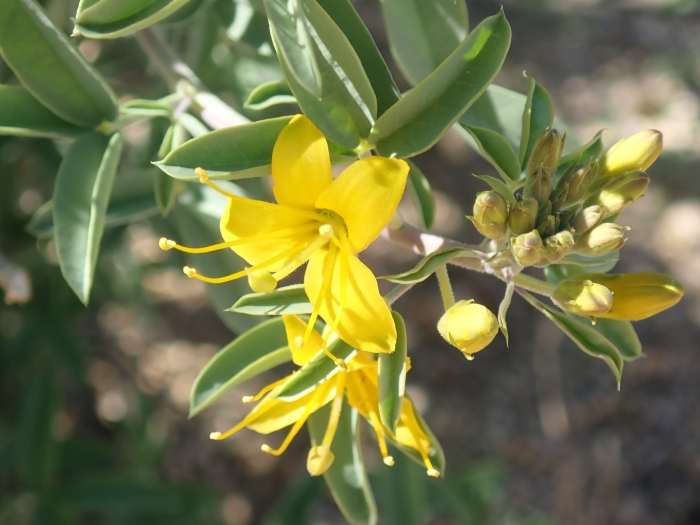Bladderpod Spiderflower
(Peritoma arborea)
Bladderpod Spiderflower (Peritoma arborea)
/
/

Randal
Public Domain
Image By:
Randal
Recorded By:
Copyright:
Public Domain
Copyright Notice:
Photo by: Randal | License Type: Public Domain | License URL: http://creativecommons.org/publicdomain/zero/1.0/ | Rights Holder: Randal | Publisher: iNaturalist | Date Created: 2020-02-17T12:40:23-08:00 |











































































Estimated Native Range
Summary
Peritoma arborea, commonly known as Bladderpod Spiderflower, is a perennial shrub native to the chaparral and coastal sage scrub of California and Baja California. It is well adapted to dry, rocky slopes and canyons, often found in areas with a Mediterranean climate. This species typically grows 0.5–2 meters (1 ft 8 in – 6 ft 7 in) high and is covered with tiny hairs that give it a grayish appearance. The Bladderpod Spiderflower is characterized by its bright yellow flowers, which bloom throughout the year, and its distinctive inflated seed pods that resemble bladders. The flowers are not particularly showy but are unique and interesting upon closer inspection. The plant emits a foul odor to discourage herbivory from insects.
The Bladderpod Spiderflower is valued for its drought tolerance and ability to thrive in poor, well-drained soils, making it an excellent choice for xeriscaping and native plant gardens. It is also used for habitat restoration projects. Its resilience to low water conditions and full sun exposure makes it a low-maintenance plant for gardeners. While it is not commonly afflicted by diseases, it can occasionally suffer from root rot if overwatered. The plant’s ability to emit an odor to deter insects is a notable defense mechanism, reducing the need for pesticides. It is not typically known to be invasive outside its native range.CC BY-SA 4.0
The Bladderpod Spiderflower is valued for its drought tolerance and ability to thrive in poor, well-drained soils, making it an excellent choice for xeriscaping and native plant gardens. It is also used for habitat restoration projects. Its resilience to low water conditions and full sun exposure makes it a low-maintenance plant for gardeners. While it is not commonly afflicted by diseases, it can occasionally suffer from root rot if overwatered. The plant’s ability to emit an odor to deter insects is a notable defense mechanism, reducing the need for pesticides. It is not typically known to be invasive outside its native range.CC BY-SA 4.0
Plant Description
- Plant Type: Shrubs
- Height: 2-6 feet
- Width: 2-6 feet
- Growth Rate: Moderate
- Flower Color: Yellow
- Flowering Season: Spring, Summer, Fall
- Leaf Retention: Evergreen
Growth Requirements
- Sun: Full Sun
- Water: Low
- Drainage: Fast
Common Uses
Bank Stabilization, Bee Garden, Bird Garden, Border Plant, Butterfly Garden, Deer Resistant, Drought Tolerant, Erosion Control, Fire Resistant, Fragrant, Low Maintenance, Salt Tolerant, Showy Flowers
Natural Habitat
Native to chaparral and coastal sage scrub of California and Baja California
Other Names
Common Names: Burro-Fat , Bladderpod Spiderflower
Scientific Names: Cleome isomeris , Isomeris arborea , Peritoma arborea , Peritoma arborea var. arborea , Cleome arborea , Cleomella arborea , Isomeris arborea var. insularis , Isomeris aborea
GBIF Accepted Name: Cleomella arborea (Nutt.) Roalson & J.C.Hall